Markets Process Tariff Talks, Jobs Data, and Q4 Reports:
Stocks posted modest losses last week as investors navigated increased volatility driven by tariff negotiations, January employment data, and Q4 corporate earnings reports.
The S&P 500 Index slipped 0.24%, while the Nasdaq Composite Index lost 0.53%. The Dow Jones Industrial Average fell 0.54%. The MSCI EAFE Index, which tracks developed overseas stock markets, edged ahead 0.17%.1,2
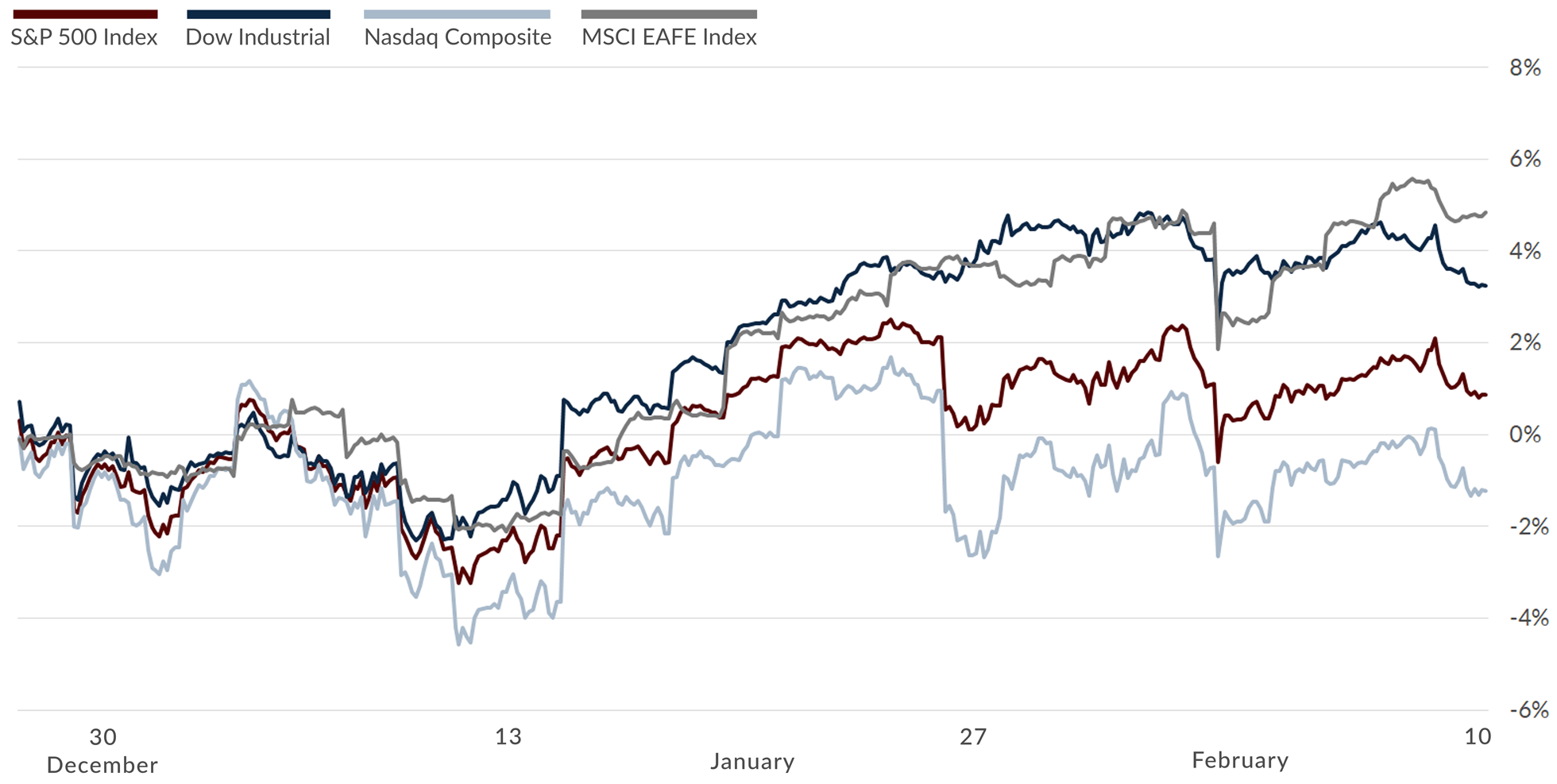
Source: Bloomberg Finance, L.P. (Performance data normalized 12/27/24 = 0)
Tariffs, Jobs, and Q4 Reports
On Monday, stocks opened lower on news that tariffs on Mexico, Canada, and China went into effect over the weekend. However, markets rebounded midmorning following news of a U.S.-Mexico deal that delayed new trade rules. News of a similar last-minute agreement with Canada followed.3
Stocks continued their rally midweek, led by technology stocks from companies that provided upbeat Q4 corporate reports.4,5
The S&P 500 and Nasdaq rose for the third consecutive day on Thursday, while the Dow experienced a slight fall as investors digested more corporate earnings reports. The week closed on a down note as a mixed jobs report and a cautionary inflation outlook disappointed investors.6,7
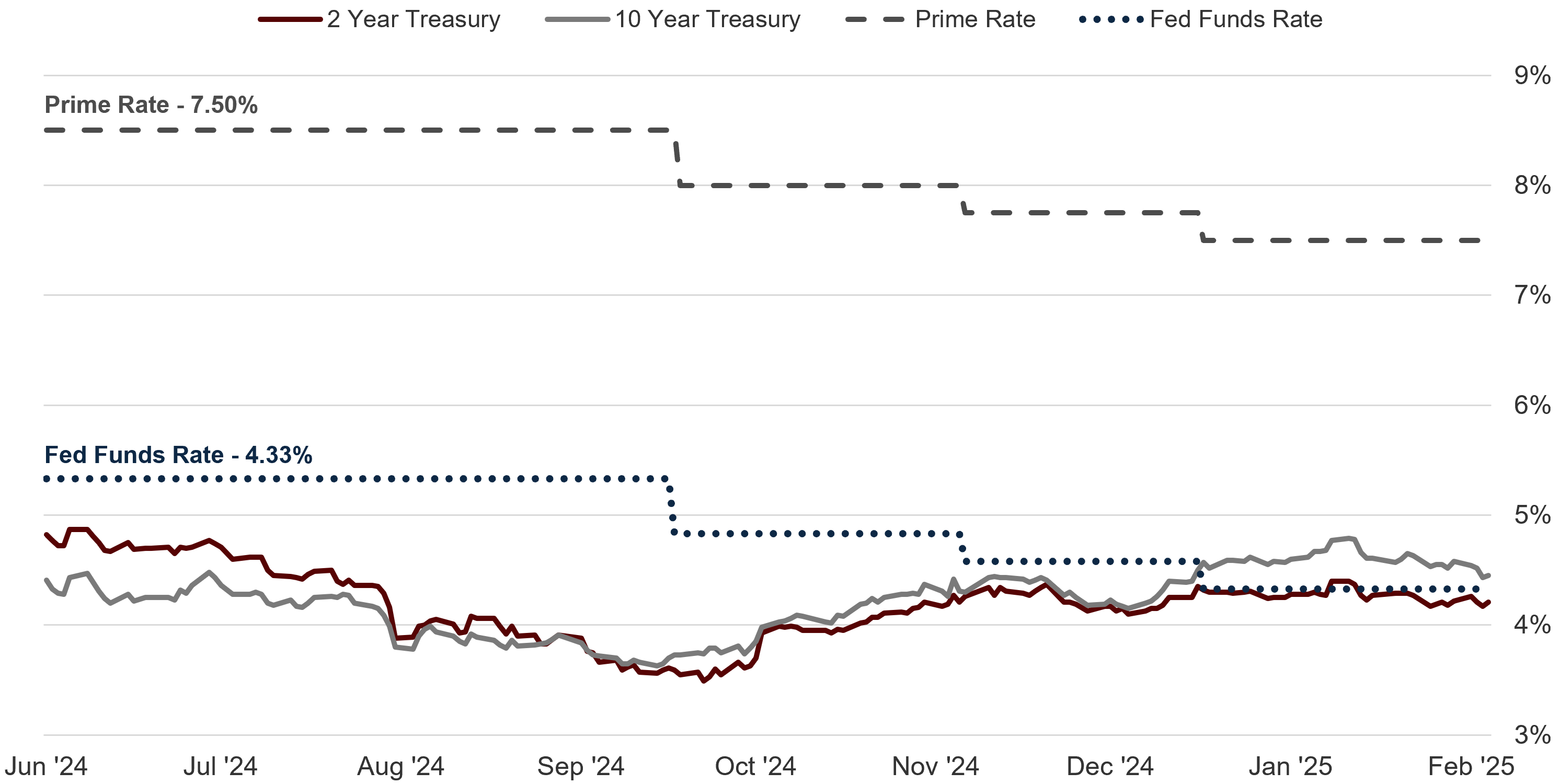
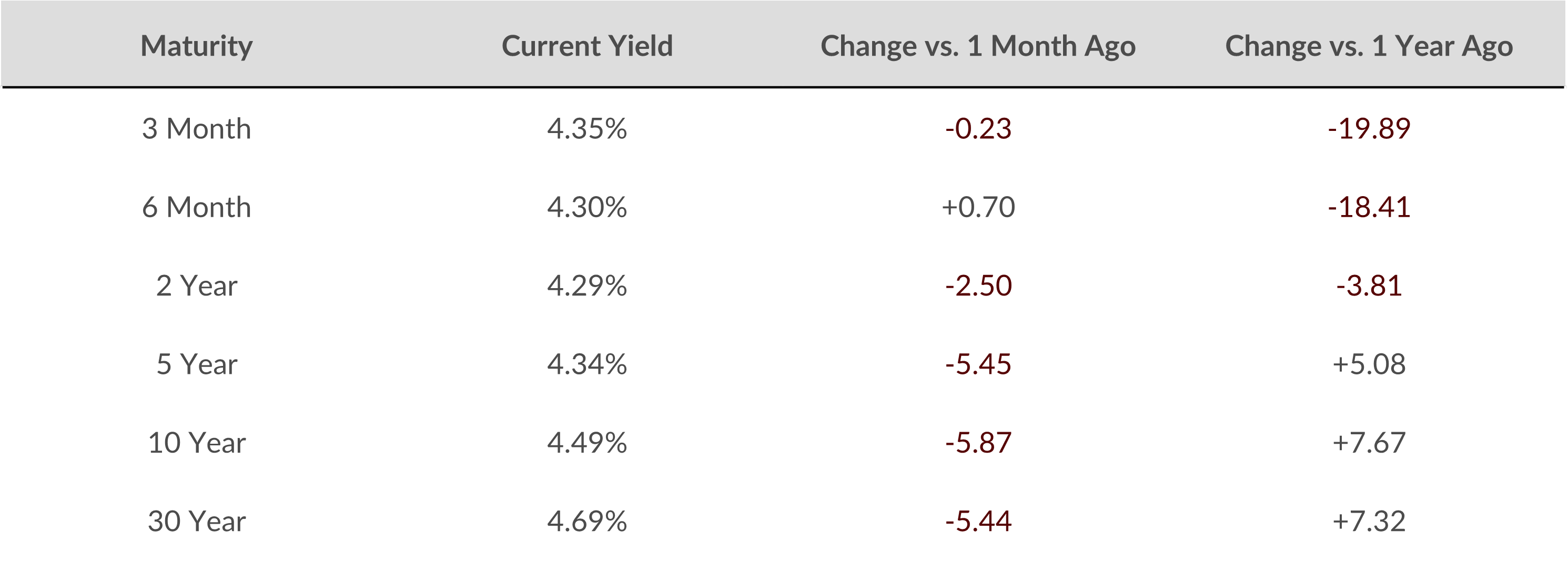
Sources: U.S. Department of the Treasury, Board of Governors of the Federal Reserve System, Charles Schwab
Mixed Signals on the Labor Market
As has happened several times in recent years, two job reports told conflicting stories about the state of the jobs market. On Friday, the Bureau of Labor Statistics reported that 143,000 jobs had been added for the month–a four-year low. Earlier in the week, the ADP report showed the economy added 188,000 new jobs, ahead of the 150,000 economists expected.8,9
Why do the reports tell different stories? Economists point to various factors, including how January can be challenging to measure accurately, typically due to the more significant number of laid-off seasonal workers.10
This Week: Key Economic Data
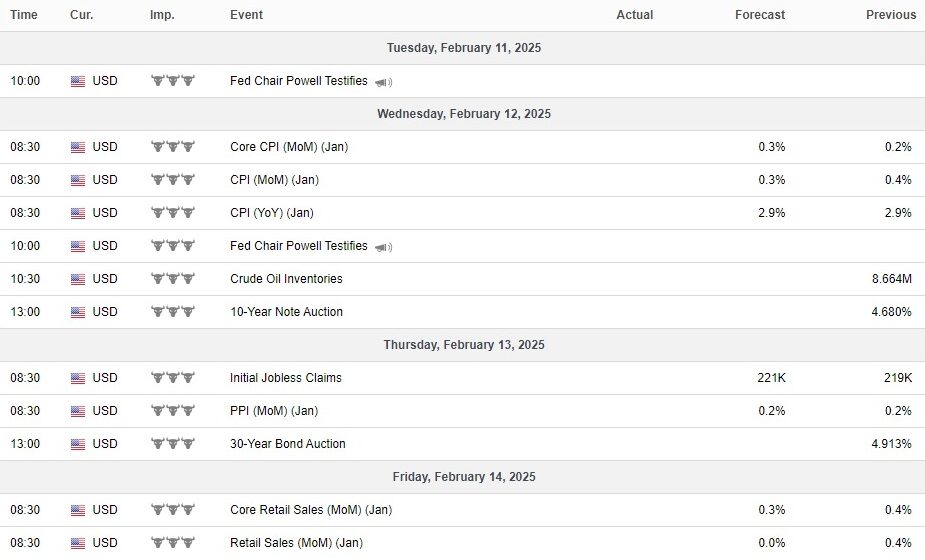
Source: Bloomberg Finance L.P.
This Week: Companies Reporting Earnings
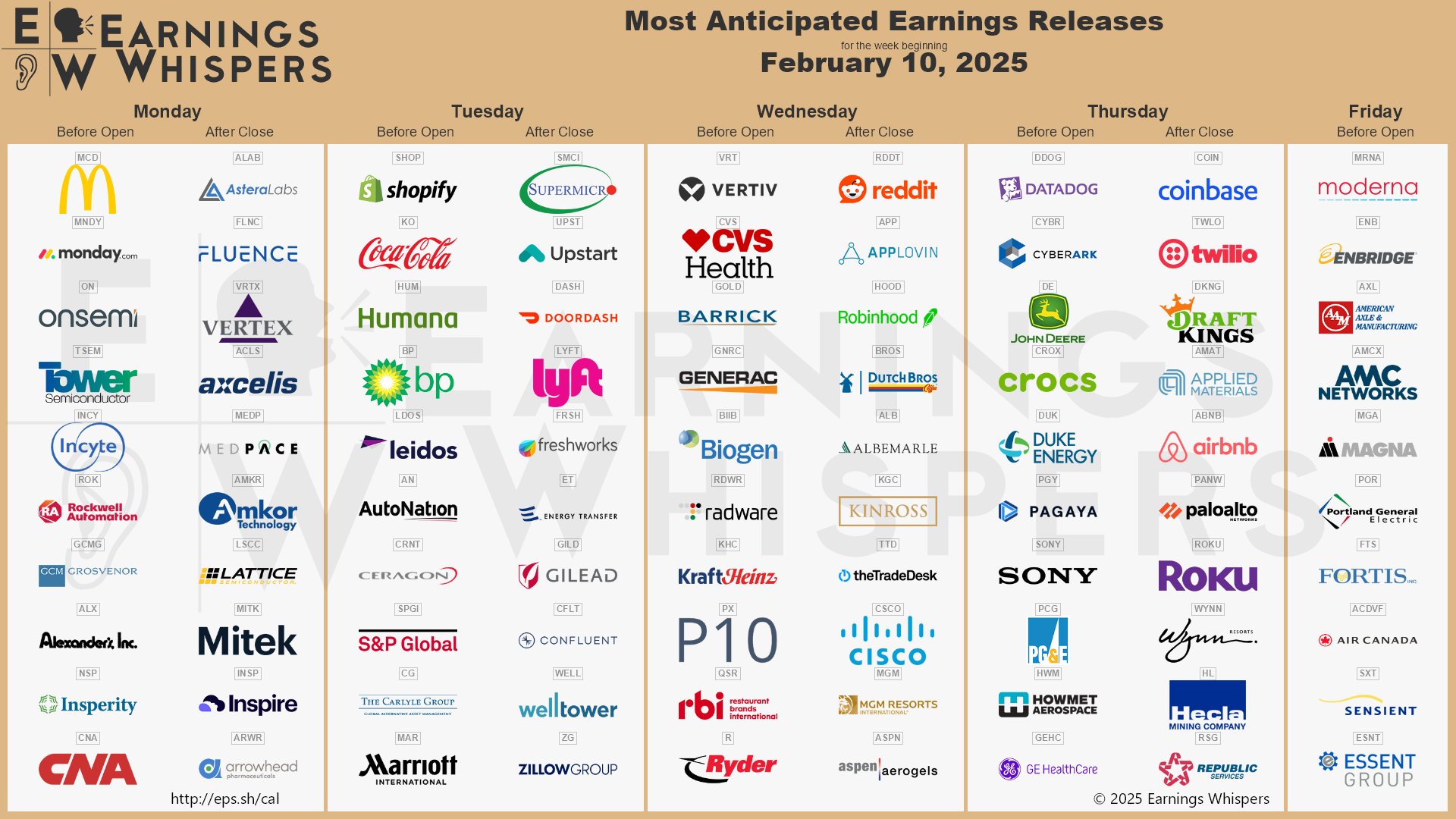
Source: EarningsWhispers
Author

Gary Aiken
Chief Investment Officer
Concord Asset Management
—
Footnotes and Sources
1The Wall Street Journal, February 7, 2025
2Investing.com, February 7, 2025
3The Wall Street Journal, February 3, 2025
4CNBC.com, February 4, 2025
5CNBC.com, February 5, 2025
6The Wall Street Journal, February 6, 2025
7The Wall Street Journal, February 7, 2025
8MarketWatch.com, February 4, 2025
9MarketWatch.com, February 5, 2025
10The Wall Street Journal, February 7, 2025
Please remember that past performance may not be indicative of future results. Different types of investments involve varying degrees of risk, and there can be no assurance that the future performance of any specific investment, investment strategy, or product (including the investments and/or investment strategies recommended or undertaken by Concord Asset Management, or any non-investment related content, made reference to directly or indirectly in this article will be profitable, equal any corresponding indicated historical performance level(s), be suitable for your portfolio or individual situation, or prove successful. Due to various factors, including changing market conditions and/or applicable laws, the content may no longer be reflective of current opinions or positions. Moreover, you should not assume that any discussion or information contained in this article serves as the receipt of, or as a substitute for, personalized investment advice from Concord Asset Management. To the extent that a reader has any questions regarding the applicability of any specific issue discussed above to his/her individual situation, he/she is encouraged to consult with the professional advisor of his/her choosing.
The companies mentioned are for informational purposes only. It should not be considered a solicitation for the purchase or sale of any specific securities. Investing involves risks, and investment decisions should be based on your own goals, time horizon, and tolerance for risk. The return and principal value of investments will fluctuate as market conditions change. When sold, investments may be worth more or less than their original cost. The forecasts or forward-looking statements are based on assumptions, may not materialize, and are subject to revision without notice. The market indexes discussed are unmanaged and generally considered representative of their respective markets. Index performance is not indicative of the past performance of a particular investment. Indexes do not incur management fees, costs, and expenses. Individuals cannot directly invest in unmanaged indexes. The Dow Jones Industrial Average is an unmanaged index that is generally considered representative of large-capitalization companies on the U.S. stock market. Nasdaq Composite is an index of the common stocks and similar securities listed on the NASDAQ stock market and is considered a broad indicator of the performance of technology and growth companies. The MSCI EAFE Index was created by Morgan Stanley Capital International (MSCI) and serves as a benchmark of the performance of major international equity markets, as represented by 21 major MSCI indexes from Europe, Australia, and Southeast Asia. The S&P 500 Composite Index is an unmanaged group of securities that are considered to be representative of the stock market in general. U.S. Treasury Notes are guaranteed by the federal government as to the timely payment of principal and interest. However, if you sell a Treasury Note prior to maturity, it may be worth more or less than the original price paid. Fixed income investments are subject to various risks, including changes in interest rates, credit quality, inflation risk, market valuations, prepayments, corporate events, tax ramifications, and other factors. International investments carry additional risks, which include differences in financial reporting standards, currency exchange rates, political risks unique to a specific country, foreign taxes and regulations, and the potential for illiquid markets. These factors may result in greater share price volatility. Please consult your financial professional for additional information.
Concord Asset Management is neither a law firm, nor a certified public accounting firm, and no portion of the content should be construed as legal or accounting advice. A copy of Concord Asset Management’ current written disclosure Brochure discussing our advisory services and fees is available upon request or at https://concordwealthpartners.com/. Please Note: If you are a Concord Asset Management or Concord Wealth Partners client, please remember to contact the firm in writing, if there are any changes in your personal/financial situation or investment objectives for the purpose of reviewing, evaluating, and/or revising our previous recommendations and/or services, or if you would like to impose, add, or to modify any reasonable restrictions to our investment advisory services. Concord Asset Management and Concord Wealth Partners shall continue to rely on the accuracy of information that you have provided. Please Note: If you are a Concord Asset Management or Concord Wealth Partners client, please advise us if you have not been receiving account statements (at least quarterly) from the account custodian.
